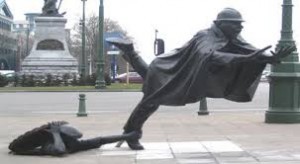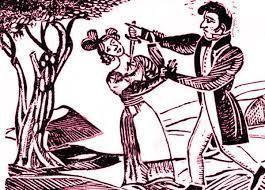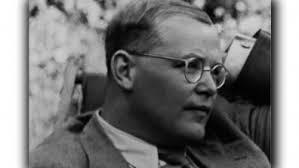Top 5 of the Moment
5
I Believe You Gotta Serve Somebody
 I was catching up on some reading the other day when I ran across a piece by New Yorker writer Sasha Frere-Jones on The Basement Tapes Complete. “In October, 1979, Dylan and his band were playing ‘Gotta Serve Somebody’ on Saturday Night Live,” he writes. “… Dylan sang, or spoke, lyrics about ‘the heavyweight champion of the world,’ someone with ‘women in a cage,’ and ‘the head of some big TV network,’ and about how, at the end of the day, these big cheeses all had to serve somebody. I was twelve, and even then I could tell that he was setting up straw men as some ridiculous proof that religious faith was universally necessary.”
I was catching up on some reading the other day when I ran across a piece by New Yorker writer Sasha Frere-Jones on The Basement Tapes Complete. “In October, 1979, Dylan and his band were playing ‘Gotta Serve Somebody’ on Saturday Night Live,” he writes. “… Dylan sang, or spoke, lyrics about ‘the heavyweight champion of the world,’ someone with ‘women in a cage,’ and ‘the head of some big TV network,’ and about how, at the end of the day, these big cheeses all had to serve somebody. I was twelve, and even then I could tell that he was setting up straw men as some ridiculous proof that religious faith was universally necessary.”
There are a lot of problems with this passage. (The bit about recognizing a straw man argument at 12 was perhaps best left unwritten.) What really caught my attention, however, was how casually he tripped over his biases. Frere-Jones allows (evidently from the age of 12) his own irreligiousness to blind him to any interpretation of “Gotta Serve Somebody” other than the most literal possible. Maybe the fault is my own ecumenical background, where metaphor—even in religion—is acknowledged. But “Serve Somebody” remains one of the rare gems from Dylan’s too-slickly produced Christian period. And Frere-Jones’s rejection of the song itself smacks of superstition.
Writing of God and the Devil in a manner that even permits a literal interpretation isn’t really the same as preaching, and 30-odd years on, Dylan’s old blues tune still smolders with conviction, both religious and secular. I mused on this to a friend who suggested I listen to Dylan’s “I Believe in You,” from Slow Train Coming, another overlooked victory from Dylan’s Christian period. Recalling The Platters’ “Smoke Gets In Your Eyes,” Dylan sings, “They asked me how I feel, and if my love is real.”
He could be singing about a wife, lover or God. I’m not only all right with that, but found myself playing the track on repeat. “I believe in you even though we be apart,” Dylan sings, his voice cracking, and “I Believe In You” emerges as a devotional with universal appeal, a love song it would take a narrow view to interpret any more narrowly than that.
4
The Torture Report
Like many Americans, I was mortified by the details included in the recently published Senate Committee Report on CIA torture. I won’t recap any of the details here, but I found some solace in the mere fact of the report’s existence. America, for all of its flaws (many of which are evidenced in the Report itself), is a country given to self-correction. While it strikes me as deplorable that we took up such a devil’s bargain—endeavoring to stay safe on the high road by getting down in the dirt— putting our own bad behavior up on a billboard and asking for comment suggests there is great hope for us yet.
3
SUE (Or in a Season of Crime)
 Original tracks added to greatest hits compilations usually aren’t all that original, ranging from remakes like “Don’t Stand So Close to Me ‘86” from the Police to new songs that trade on past glories, like The Rolling Stones “Doom and Gloom.” Bowie’s “SUE (Or in a Season of Crime)” is something else altogether. At once sinister and grand, the seven-plus minute version of “SUE” is an epic conflagration of tastes not previously married: experimental jazz and American murder balladry, a genre associated with blues and country music. The jungle rhythm that threatens to tear the whole carefully orchestrated production apart from the bottom up acts—intentionally or not—as a rebuke to Bowie’s critics: If Bowie only pursued Jungle music for 1997’s Earthling in a vain effort to sound contemporary—the usual conceit—why is he still mining that field?
Original tracks added to greatest hits compilations usually aren’t all that original, ranging from remakes like “Don’t Stand So Close to Me ‘86” from the Police to new songs that trade on past glories, like The Rolling Stones “Doom and Gloom.” Bowie’s “SUE (Or in a Season of Crime)” is something else altogether. At once sinister and grand, the seven-plus minute version of “SUE” is an epic conflagration of tastes not previously married: experimental jazz and American murder balladry, a genre associated with blues and country music. The jungle rhythm that threatens to tear the whole carefully orchestrated production apart from the bottom up acts—intentionally or not—as a rebuke to Bowie’s critics: If Bowie only pursued Jungle music for 1997’s Earthling in a vain effort to sound contemporary—the usual conceit—why is he still mining that field?
“SUE” works best, however, without further reference to the singer’s own career. Bowie’s decision to cast a murder ballad—“I pushed you down beneath the weeds”—against so sophisticated a backdrop (his backing band here is the Maria Schneider Orchestra) seems anything but accidental. From factory to field, from shotgun shacks to moneyed estates, the impulse to love can turn into the intention to destroy with terrifying speed.
2
My Brakes
Years ago, as a child, my uncle would take me out sometimes when he ran errands around the city. If he felt the car behind him drew too close, he slammed on his breaks. He’d laugh heartily as the other driver fell back. I only realized the danger he was putting us in when I got behind the wheel myself. I recalled this recently because of late I have been driving some country roads, where locals know each curve so well they tend to take even the sharpest of turns at high speed. A few drivers have essentially hitched themselves to my bumper, as if they think I’m going to speed up on unfamiliar roads because their headlights are filling my rearview mirror. In response, I’ve developed what I come to call “The Modified Uncle.” I tap my breaks, like I’m keeping time to a rainfall. No one is ever at risk, but seeing my break lights flash on and off at a steady rhythm has the desired effect, granting fellow motorists a renewed sense of patience and restraint as they fall back a couple of car lengths.
1
Bonhoeffer: Pastor, Martyr, Prophet, Spy by Eric Metaxas
 I spent the last few weeks, twins permitting, plowing through Bonhoeffer. For those who don’t know, Deitrich Bonhoeffer was a German theologian and pastor who saw through the Nazi party’s thinly veiled attempts to turn the church into a pagan, state-worshipping institution and tried to do something about it—from fighting for the church’s independence and traditional beliefs to plotting to assassinate Hitler. The book is sprawling, comprehensive and meticulously plotted, with enough historical detail to make you feel the weight of each decision Bonhoeffer made on the way to his own personal destruction. The result is a tale of personal triumph—of the deep victory inherent in acting according to your highest principles, whatever the cost.
I spent the last few weeks, twins permitting, plowing through Bonhoeffer. For those who don’t know, Deitrich Bonhoeffer was a German theologian and pastor who saw through the Nazi party’s thinly veiled attempts to turn the church into a pagan, state-worshipping institution and tried to do something about it—from fighting for the church’s independence and traditional beliefs to plotting to assassinate Hitler. The book is sprawling, comprehensive and meticulously plotted, with enough historical detail to make you feel the weight of each decision Bonhoeffer made on the way to his own personal destruction. The result is a tale of personal triumph—of the deep victory inherent in acting according to your highest principles, whatever the cost.
Steve Volk's Blog
- Steve Volk's profile
- 18 followers



